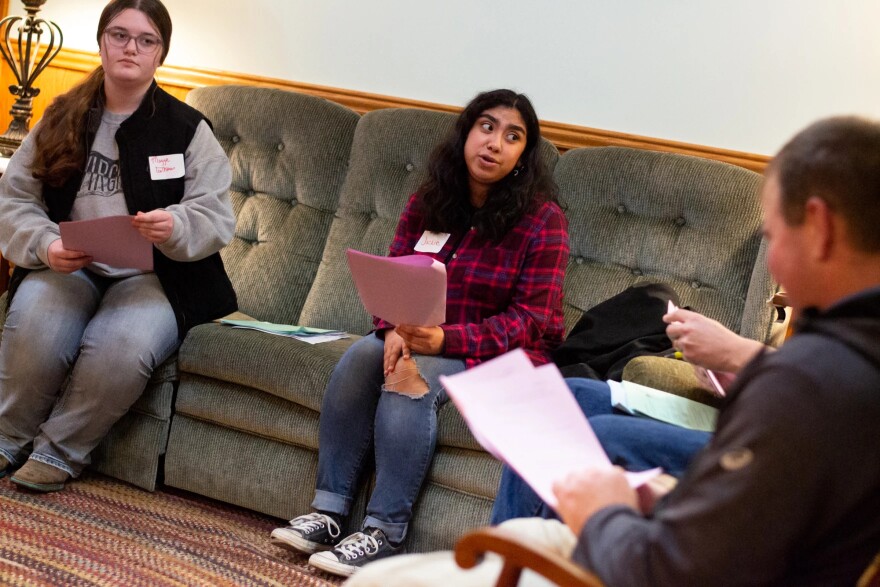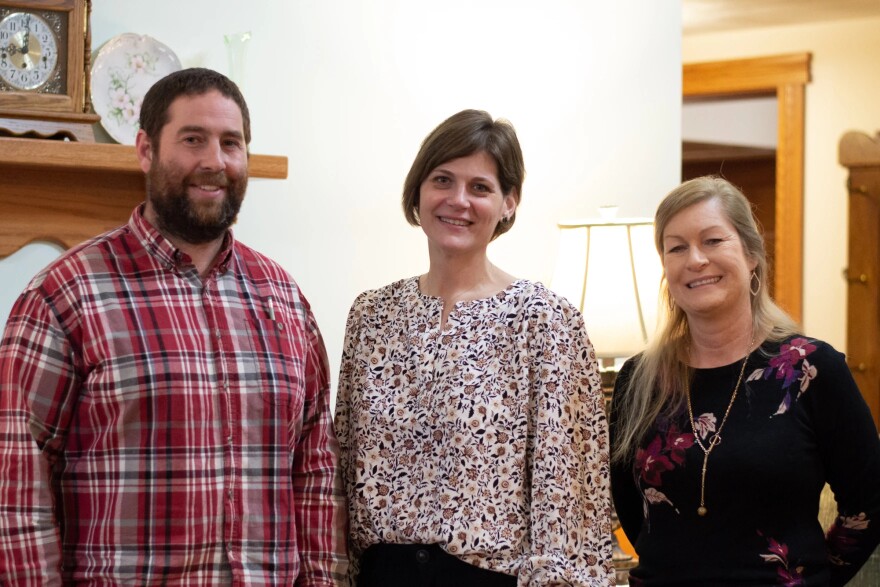Read the original story on WMRA's website.
About 35 people gathered for a dinner program on Jan. 21 near Clover Hill in Rockingham County. Most of them were dairy farmers. Others dealt in beef, some poultry and several were still babes in arms.
They were brought together by the local cooperative extension office and health care providers to watch a few skits about farm hazards and injuries, in the hopes of sparking conversations about their own safety.
Broadway High School students Maggie Toothman and Jackie Diaz, teacher Herb Hoffeditz and farmer Vince Rhodes were the evening's actors.
Rhodes: You've got that high blood pressure. Farming takes a toll on our health.
Hoffeditz: I guess it does. If the government would just stay out of it — you know, in California, they're banning round bales?
Toothman: What? That's the best way to feed!
Hoffeditz: Yes, I know! But those PETA people are claiming that cows aren't getting a square meal anymore!

The Virginia Cooperative Extension is a program run by Virginia Tech and Virginia State University to educate farmers — and anyone else who’s interested — about agricultural best practices.
Events similar to January’s have been held elsewhere in the state, but this was the program's debut in the Shenandoah Valley.
“This is a research-based program,” said Jeremy Daubert, the dairy extension agent in Rockingham County. “So, there's a lot of data that says the process works for making change in the community.
Daubert and his wife used to run a dairy farm, and they still raise animals on the side. Most of the evening's attendees were people he works with often through the extension office.
“I mean, you offer good food and people will come!” Daubert said. “So, we had really good food, and people were here. And there were some interactions and a lot of discussions after the official meeting was over, so I think it went well.
According toa recent Washington Post analysis, farmers rate among the happiest and most fulfilled working adults compared to those in other industries. But the profession is also inherently dangerous.
TheCenters for Disease Control and Prevention ranks agriculture among the most hazardous industries, tallying more than 350 farmwork-related deaths in 2020 — many caused by tractors overturning. And aPenn State study supported by the United States Department of Agriculture found that nonfatal farm injuries are likely underreported in surveys, with 60,000 people being treated in emergency departments for such injuries from 2015 to 2019. The most common injuries were fractures, followed by open wounds and amputations, with tractors again being the most common source of injury.
Michelle Seekford, a family nurse practitioner and the owner of Valley Urgent Care in Harrisonburg, helped organize the dinner program.
“Within our clinic, we see a lot of folks that have had interactions with animals where they have gotten run over by a cow or mauled by a steer or a heifer,” Seekford said. “[They] may get lacerations because they've been working with a piece of equipment and got cut. Sometimes we will see folks that have had repetitive trauma injuries from lifting bales of hay or moving equipment.”

After each skit, attendees had an opportunity to discuss their own experiences. People were hesitant at first, but they were swapping stories by the end of the evening — many about getting pinned by animals or silo incidents, including fires and gas exposure.
“We fill silos twice a year,” said Tim Liskey, who owns a dairy farm on the east side of Harrisonburg. “Most of the time it's not a problem, but when the conditions are just right, and it was that time for me, that gas built up.
Silo gas — also called nitrogen dioxide — is a toxic byproduct that can build up as stored food ferments.High levels of exposure can result in chemical pneumonia or even death.
“Luckily, I wasn't exposed at a high level, but I did go to UVA for five days,” Liskey said. “Luckily I had no scar tissue damage in my lungs. … I learned afterwards that I could get a gas meter from the Rockingham Fire Department, and it's free to use. … They showed me how to use it, and it's pretty simple.
Liskey and other farmers commiserated about how the constant rush to finish a task or beat the weather can lead to mishaps.
“A lot of things are out of our control, but we do have the choice, I reckon, to think a little bit about the consequences if we're in too much of a hurry sometimes,” Liskey said. “I think it's just good to review with fellow farmers, and sometimes I think we learn off of each other quicker than if we just read something.”
The extension office will host more dinner theater events up and down the Shenandoah Valley later this year.


